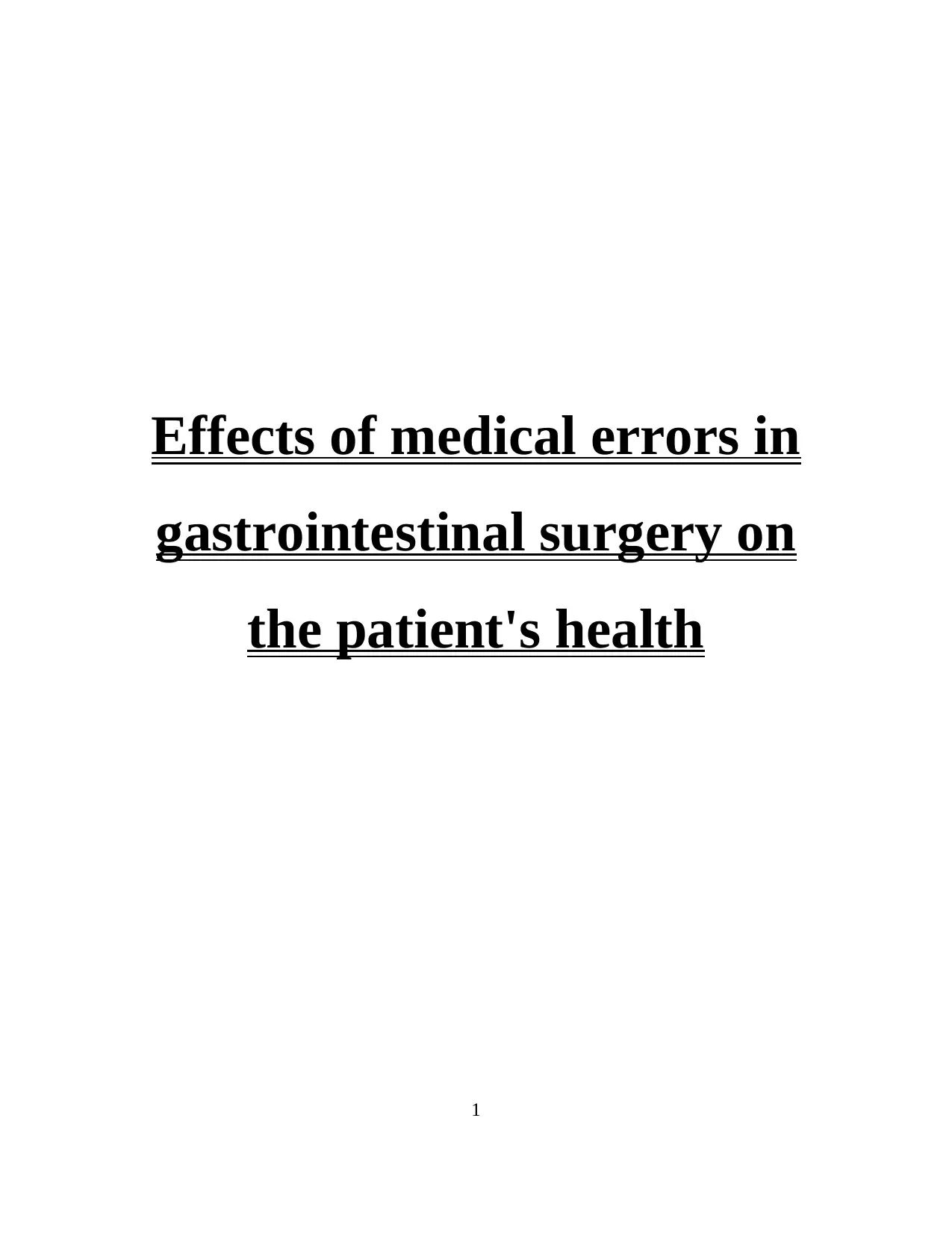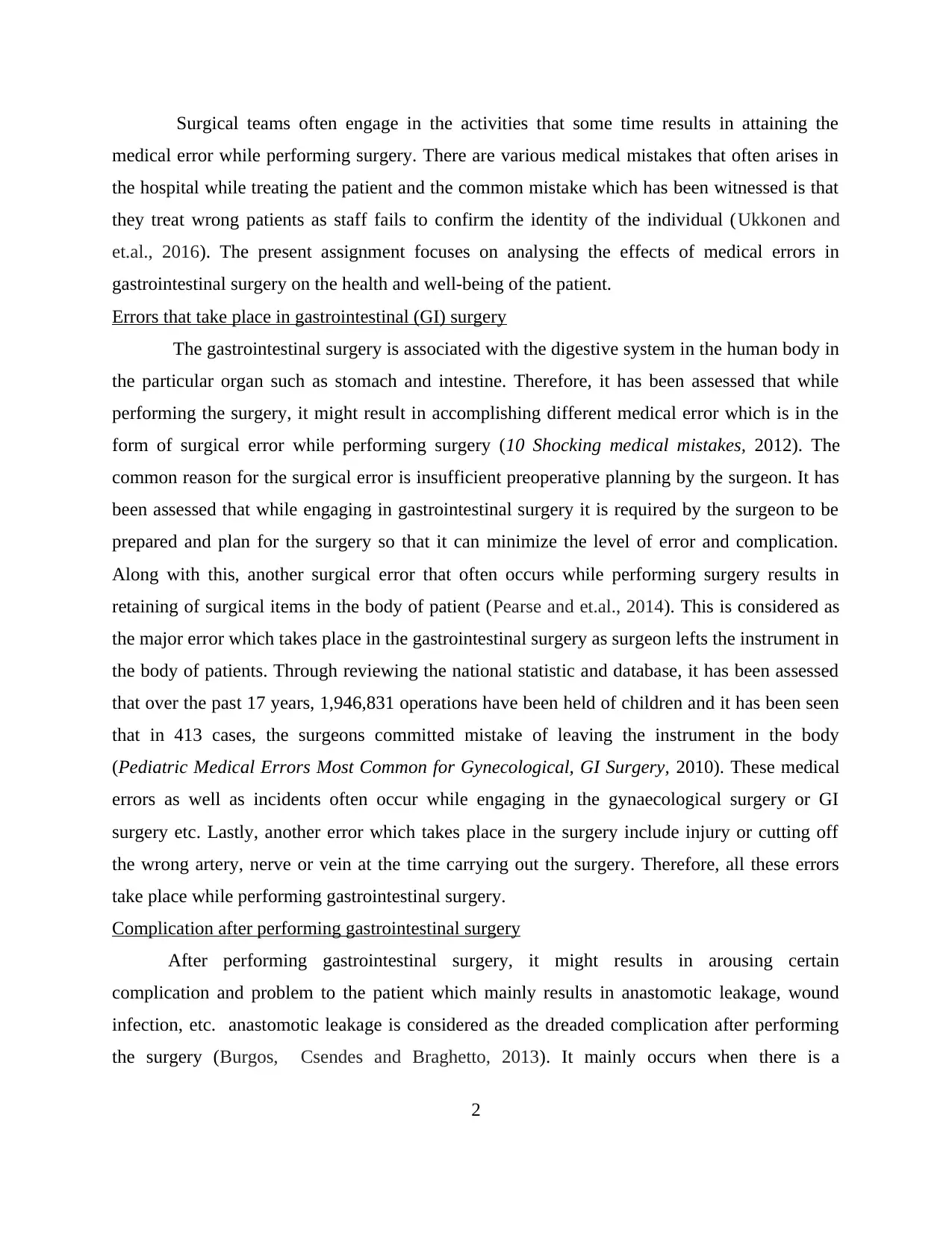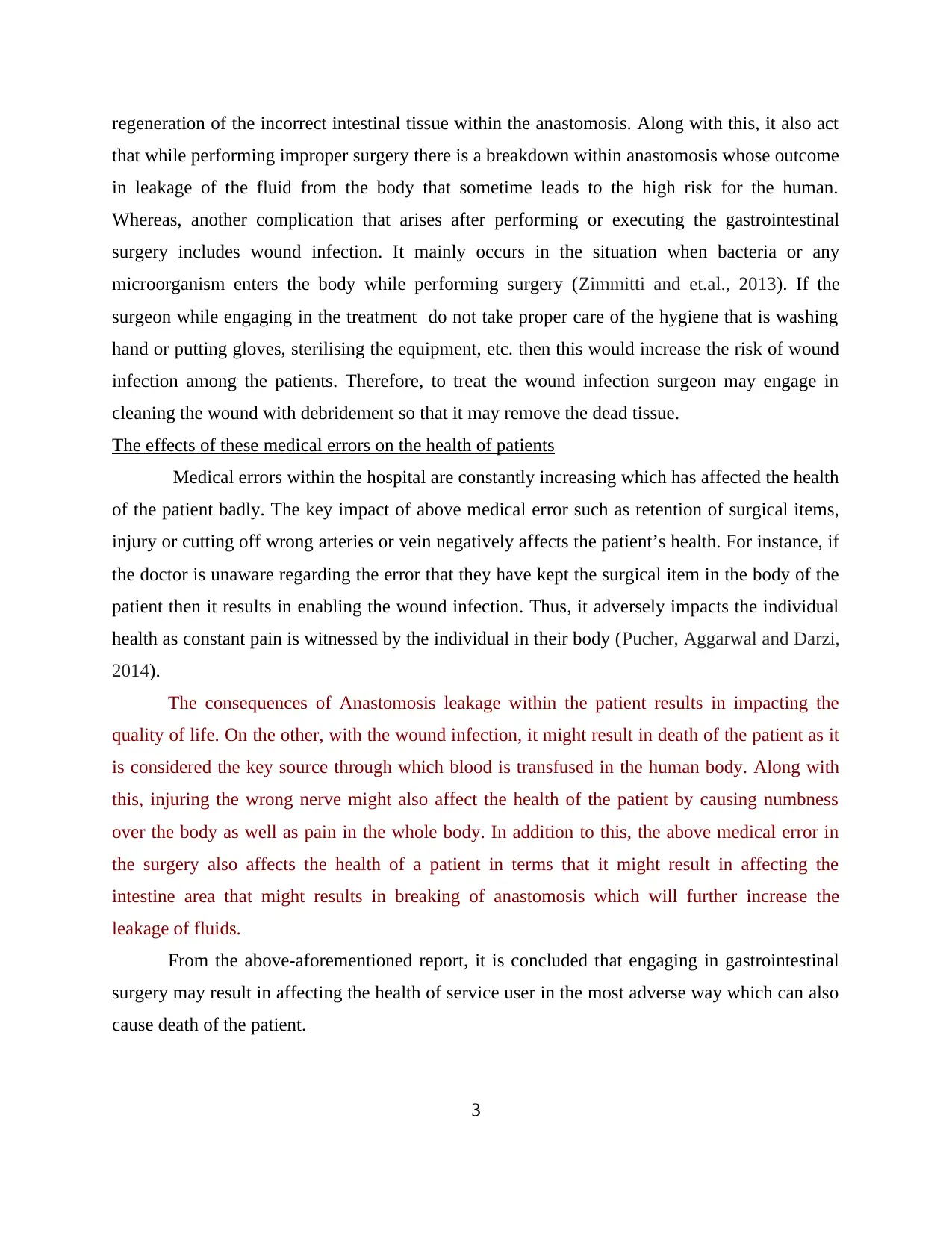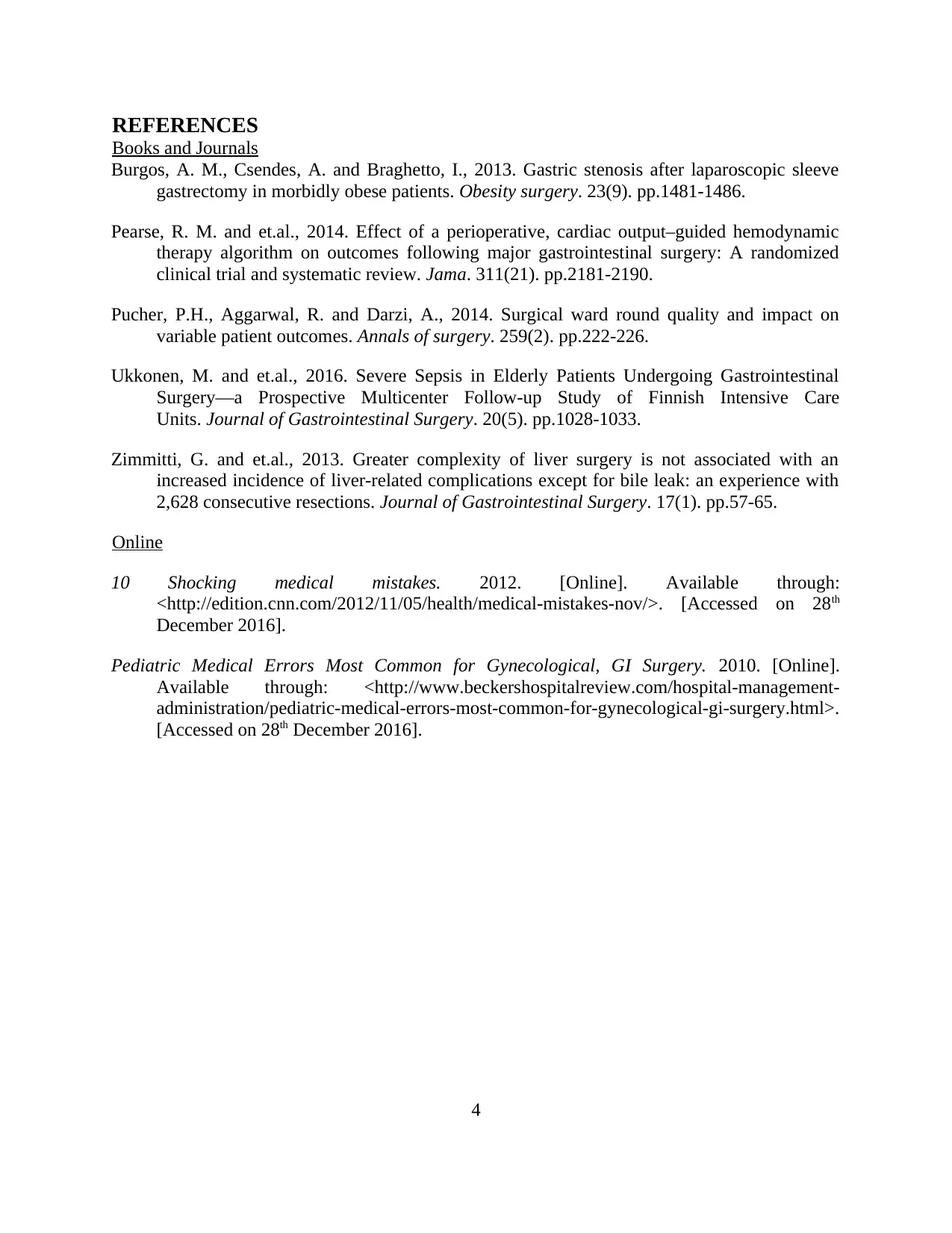Analyzing the Effects of Medical Errors in Gastrointestinal Surgery
VerifiedAdded on 2020/01/07
|4
|1185
|134
Report
AI Summary
This report examines the effects of medical errors in gastrointestinal (GI) surgery on patient health. It identifies common surgical errors, such as insufficient preoperative planning, retained surgical items, and injuries to arteries, nerves, or veins. The report details complications arising post-surgery, including anastomotic leakage and wound infections, emphasizing their impact on patients' quality of life. It highlights the adverse health consequences of these errors, such as wound infections, constant pain, numbness, and even death. The analysis underscores the critical need for improved surgical practices and patient safety measures to mitigate these risks and improve patient outcomes. The report references relevant books, journals, and online resources to support its findings.

Effects of medical errors in
gastrointestinal surgery on
the patient's health
1
gastrointestinal surgery on
the patient's health
1
Paraphrase This Document
Need a fresh take? Get an instant paraphrase of this document with our AI Paraphraser

Surgical teams often engage in the activities that some time results in attaining the
medical error while performing surgery. There are various medical mistakes that often arises in
the hospital while treating the patient and the common mistake which has been witnessed is that
they treat wrong patients as staff fails to confirm the identity of the individual (Ukkonen and
et.al., 2016). The present assignment focuses on analysing the effects of medical errors in
gastrointestinal surgery on the health and well-being of the patient.
Errors that take place in gastrointestinal (GI) surgery
The gastrointestinal surgery is associated with the digestive system in the human body in
the particular organ such as stomach and intestine. Therefore, it has been assessed that while
performing the surgery, it might result in accomplishing different medical error which is in the
form of surgical error while performing surgery (10 Shocking medical mistakes, 2012). The
common reason for the surgical error is insufficient preoperative planning by the surgeon. It has
been assessed that while engaging in gastrointestinal surgery it is required by the surgeon to be
prepared and plan for the surgery so that it can minimize the level of error and complication.
Along with this, another surgical error that often occurs while performing surgery results in
retaining of surgical items in the body of patient (Pearse and et.al., 2014). This is considered as
the major error which takes place in the gastrointestinal surgery as surgeon lefts the instrument in
the body of patients. Through reviewing the national statistic and database, it has been assessed
that over the past 17 years, 1,946,831 operations have been held of children and it has been seen
that in 413 cases, the surgeons committed mistake of leaving the instrument in the body
(Pediatric Medical Errors Most Common for Gynecological, GI Surgery, 2010). These medical
errors as well as incidents often occur while engaging in the gynaecological surgery or GI
surgery etc. Lastly, another error which takes place in the surgery include injury or cutting off
the wrong artery, nerve or vein at the time carrying out the surgery. Therefore, all these errors
take place while performing gastrointestinal surgery.
Complication after performing gastrointestinal surgery
After performing gastrointestinal surgery, it might results in arousing certain
complication and problem to the patient which mainly results in anastomotic leakage, wound
infection, etc. anastomotic leakage is considered as the dreaded complication after performing
the surgery (Burgos, Csendes and Braghetto, 2013). It mainly occurs when there is a
2
medical error while performing surgery. There are various medical mistakes that often arises in
the hospital while treating the patient and the common mistake which has been witnessed is that
they treat wrong patients as staff fails to confirm the identity of the individual (Ukkonen and
et.al., 2016). The present assignment focuses on analysing the effects of medical errors in
gastrointestinal surgery on the health and well-being of the patient.
Errors that take place in gastrointestinal (GI) surgery
The gastrointestinal surgery is associated with the digestive system in the human body in
the particular organ such as stomach and intestine. Therefore, it has been assessed that while
performing the surgery, it might result in accomplishing different medical error which is in the
form of surgical error while performing surgery (10 Shocking medical mistakes, 2012). The
common reason for the surgical error is insufficient preoperative planning by the surgeon. It has
been assessed that while engaging in gastrointestinal surgery it is required by the surgeon to be
prepared and plan for the surgery so that it can minimize the level of error and complication.
Along with this, another surgical error that often occurs while performing surgery results in
retaining of surgical items in the body of patient (Pearse and et.al., 2014). This is considered as
the major error which takes place in the gastrointestinal surgery as surgeon lefts the instrument in
the body of patients. Through reviewing the national statistic and database, it has been assessed
that over the past 17 years, 1,946,831 operations have been held of children and it has been seen
that in 413 cases, the surgeons committed mistake of leaving the instrument in the body
(Pediatric Medical Errors Most Common for Gynecological, GI Surgery, 2010). These medical
errors as well as incidents often occur while engaging in the gynaecological surgery or GI
surgery etc. Lastly, another error which takes place in the surgery include injury or cutting off
the wrong artery, nerve or vein at the time carrying out the surgery. Therefore, all these errors
take place while performing gastrointestinal surgery.
Complication after performing gastrointestinal surgery
After performing gastrointestinal surgery, it might results in arousing certain
complication and problem to the patient which mainly results in anastomotic leakage, wound
infection, etc. anastomotic leakage is considered as the dreaded complication after performing
the surgery (Burgos, Csendes and Braghetto, 2013). It mainly occurs when there is a
2

regeneration of the incorrect intestinal tissue within the anastomosis. Along with this, it also act
that while performing improper surgery there is a breakdown within anastomosis whose outcome
in leakage of the fluid from the body that sometime leads to the high risk for the human.
Whereas, another complication that arises after performing or executing the gastrointestinal
surgery includes wound infection. It mainly occurs in the situation when bacteria or any
microorganism enters the body while performing surgery (Zimmitti and et.al., 2013). If the
surgeon while engaging in the treatment do not take proper care of the hygiene that is washing
hand or putting gloves, sterilising the equipment, etc. then this would increase the risk of wound
infection among the patients. Therefore, to treat the wound infection surgeon may engage in
cleaning the wound with debridement so that it may remove the dead tissue.
The effects of these medical errors on the health of patients
Medical errors within the hospital are constantly increasing which has affected the health
of the patient badly. The key impact of above medical error such as retention of surgical items,
injury or cutting off wrong arteries or vein negatively affects the patient’s health. For instance, if
the doctor is unaware regarding the error that they have kept the surgical item in the body of the
patient then it results in enabling the wound infection. Thus, it adversely impacts the individual
health as constant pain is witnessed by the individual in their body (Pucher, Aggarwal and Darzi,
2014).
The consequences of Anastomosis leakage within the patient results in impacting the
quality of life. On the other, with the wound infection, it might result in death of the patient as it
is considered the key source through which blood is transfused in the human body. Along with
this, injuring the wrong nerve might also affect the health of the patient by causing numbness
over the body as well as pain in the whole body. In addition to this, the above medical error in
the surgery also affects the health of a patient in terms that it might result in affecting the
intestine area that might results in breaking of anastomosis which will further increase the
leakage of fluids.
From the above-aforementioned report, it is concluded that engaging in gastrointestinal
surgery may result in affecting the health of service user in the most adverse way which can also
cause death of the patient.
3
that while performing improper surgery there is a breakdown within anastomosis whose outcome
in leakage of the fluid from the body that sometime leads to the high risk for the human.
Whereas, another complication that arises after performing or executing the gastrointestinal
surgery includes wound infection. It mainly occurs in the situation when bacteria or any
microorganism enters the body while performing surgery (Zimmitti and et.al., 2013). If the
surgeon while engaging in the treatment do not take proper care of the hygiene that is washing
hand or putting gloves, sterilising the equipment, etc. then this would increase the risk of wound
infection among the patients. Therefore, to treat the wound infection surgeon may engage in
cleaning the wound with debridement so that it may remove the dead tissue.
The effects of these medical errors on the health of patients
Medical errors within the hospital are constantly increasing which has affected the health
of the patient badly. The key impact of above medical error such as retention of surgical items,
injury or cutting off wrong arteries or vein negatively affects the patient’s health. For instance, if
the doctor is unaware regarding the error that they have kept the surgical item in the body of the
patient then it results in enabling the wound infection. Thus, it adversely impacts the individual
health as constant pain is witnessed by the individual in their body (Pucher, Aggarwal and Darzi,
2014).
The consequences of Anastomosis leakage within the patient results in impacting the
quality of life. On the other, with the wound infection, it might result in death of the patient as it
is considered the key source through which blood is transfused in the human body. Along with
this, injuring the wrong nerve might also affect the health of the patient by causing numbness
over the body as well as pain in the whole body. In addition to this, the above medical error in
the surgery also affects the health of a patient in terms that it might result in affecting the
intestine area that might results in breaking of anastomosis which will further increase the
leakage of fluids.
From the above-aforementioned report, it is concluded that engaging in gastrointestinal
surgery may result in affecting the health of service user in the most adverse way which can also
cause death of the patient.
3
⊘ This is a preview!⊘
Do you want full access?
Subscribe today to unlock all pages.

Trusted by 1+ million students worldwide

REFERENCES
Books and Journals
Burgos, A. M., Csendes, A. and Braghetto, I., 2013. Gastric stenosis after laparoscopic sleeve
gastrectomy in morbidly obese patients. Obesity surgery. 23(9). pp.1481-1486.
Pearse, R. M. and et.al., 2014. Effect of a perioperative, cardiac output–guided hemodynamic
therapy algorithm on outcomes following major gastrointestinal surgery: A randomized
clinical trial and systematic review. Jama. 311(21). pp.2181-2190.
Pucher, P.H., Aggarwal, R. and Darzi, A., 2014. Surgical ward round quality and impact on
variable patient outcomes. Annals of surgery. 259(2). pp.222-226.
Ukkonen, M. and et.al., 2016. Severe Sepsis in Elderly Patients Undergoing Gastrointestinal
Surgery—a Prospective Multicenter Follow-up Study of Finnish Intensive Care
Units. Journal of Gastrointestinal Surgery. 20(5). pp.1028-1033.
Zimmitti, G. and et.al., 2013. Greater complexity of liver surgery is not associated with an
increased incidence of liver-related complications except for bile leak: an experience with
2,628 consecutive resections. Journal of Gastrointestinal Surgery. 17(1). pp.57-65.
Online
10 Shocking medical mistakes. 2012. [Online]. Available through:
<http://edition.cnn.com/2012/11/05/health/medical-mistakes-nov/>. [Accessed on 28th
December 2016].
Pediatric Medical Errors Most Common for Gynecological, GI Surgery. 2010. [Online].
Available through: <http://www.beckershospitalreview.com/hospital-management-
administration/pediatric-medical-errors-most-common-for-gynecological-gi-surgery.html>.
[Accessed on 28th December 2016].
4
Books and Journals
Burgos, A. M., Csendes, A. and Braghetto, I., 2013. Gastric stenosis after laparoscopic sleeve
gastrectomy in morbidly obese patients. Obesity surgery. 23(9). pp.1481-1486.
Pearse, R. M. and et.al., 2014. Effect of a perioperative, cardiac output–guided hemodynamic
therapy algorithm on outcomes following major gastrointestinal surgery: A randomized
clinical trial and systematic review. Jama. 311(21). pp.2181-2190.
Pucher, P.H., Aggarwal, R. and Darzi, A., 2014. Surgical ward round quality and impact on
variable patient outcomes. Annals of surgery. 259(2). pp.222-226.
Ukkonen, M. and et.al., 2016. Severe Sepsis in Elderly Patients Undergoing Gastrointestinal
Surgery—a Prospective Multicenter Follow-up Study of Finnish Intensive Care
Units. Journal of Gastrointestinal Surgery. 20(5). pp.1028-1033.
Zimmitti, G. and et.al., 2013. Greater complexity of liver surgery is not associated with an
increased incidence of liver-related complications except for bile leak: an experience with
2,628 consecutive resections. Journal of Gastrointestinal Surgery. 17(1). pp.57-65.
Online
10 Shocking medical mistakes. 2012. [Online]. Available through:
<http://edition.cnn.com/2012/11/05/health/medical-mistakes-nov/>. [Accessed on 28th
December 2016].
Pediatric Medical Errors Most Common for Gynecological, GI Surgery. 2010. [Online].
Available through: <http://www.beckershospitalreview.com/hospital-management-
administration/pediatric-medical-errors-most-common-for-gynecological-gi-surgery.html>.
[Accessed on 28th December 2016].
4
1 out of 4
Related Documents
Your All-in-One AI-Powered Toolkit for Academic Success.
+13062052269
info@desklib.com
Available 24*7 on WhatsApp / Email
![[object Object]](/_next/static/media/star-bottom.7253800d.svg)
Unlock your academic potential
Copyright © 2020–2026 A2Z Services. All Rights Reserved. Developed and managed by ZUCOL.





